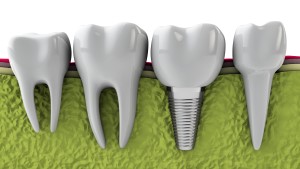How Closely Do Dental Implants Resemble a Natural Tooth?

Dental implants are quite similar structurally to biological teeth, and this quality gives these devices most of their desirable qualities, such as stability and longevity.
Although we focus mostly on the crown, which is the visible portion of the tooth, a biological tooth also has a root that serves several valuable purposes. It helps the tooth to withstand stronger chewing forces, and it anchors the jawbone and prevents it from atrophying as well.
Dental implants, which are small titanium cylinders that can be placed in the jaw by an oral surgeon, essentially perform the same functions as the roots of biological teeth. They support the replacement for the crown(s) of the missing teeth, whether that is a single crown, bridge or denture.
Patients who work with an oral surgeon to get dental implants also are likely to avoid the jawbone atrophy that follows tooth loss and occurs with other tooth replacements that do not have a root-like structure. As such, an appliance that is supported by dental implants will fit better after several years, whereas a conventional dental bridge or denture may need to be replaced eventually if the jaw’s shape changes too drastically.
Another advantage of dental implants is that they tend to be more effective at chewing than bridges or dentures. The connection with the jawbone allows the implant to tolerate stronger chewing forces, so a dental implant patient will need to eliminate fewer, if any, foods from his or her diet.
An implant also stands alone, unlike a dental bridge that requires crowns to be placed on adjacent teeth to support the pontic (tooth replacement). This quality makes it easier for an implant patient to brush and floss and doesn’t compromise the structural integrity of remaining natural teeth.
A dental implant is quite similar to a biological tooth and therefore is the most structurally complete tooth replacement option. If you want a device that’s as close to your absent natural tooth as possible, consider this treatment and schedule an initial appointment at our office to learn more about it and whether it might be appropriate in your case.
